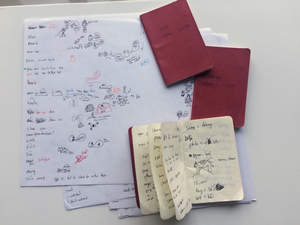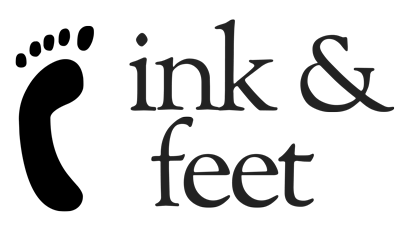
Language Learning for Introverts Part 3: The Deadline.
Somewhere over the Pacific ocean on my flight to Thailand, I set my goal to be conversationally fluent in Thai by February 1 - which has arrived. So, how'd I do?
Language fluency in Thai: FAILED!
My goal was CERFL B1. A level at which, normal, everyday people whom you interact with in normal, everyday ways for whatever your life is like. They can understand you and you can understand them for pretty much every normal task.
After three months, I'm able to communicate with them in normal ways, and they can understand me, but I'm not able to parse and understand all of their their responses. That puts me at CERFL A2 - not quite there.
One month into my time here, I was on pace to get there, but I was slowed by a couple mistakes I'll detail below. But in one important way, I came out way, way ahead of where I'd expected.
Cultural fluency in Thai: PASSED!
One sign of how well you look, act, and behave like a local is if people switch languages to your presumed fluency when speaking to you. Here in Bangkok, despite being as tall and blonde-spike as they come, pretty much nobody tries to switch. I walk up, speak Thai confidently to them, and they respond with a barrage of words, at the same pace as they do with other folks. The default expectation is that I'm fluent.
Curious if it was just Bangkok, I took some time at a cafe and watched how other farang were treated. Sure enough, they were greeted and engaged with in English the whole time, by the same person who threw a flurry of Thai at me. In restaurants, the other customers turn to me, and speak Thai.
The reason comes down to how I carry myself, how I talk, and how I interact with spaces. I've been eating with a spoon and a fork together for so long now it comes without thinking. (I tried using only a fork the other day and it felt so strange. I'm not sure I can ever go back!) I know how to browse, and how to pay. I know that after the first bite, the chef is always looking for your reaction, and an "Aroy mak!" will nearly always make you a friend - or at least, make someone smile.
I wai at everything, without thinking. I have an addiction (as does half the country to gaffe yen - Thai iced coffee.) Most importantly, I am quiet. I talk with the minimum volume needed, and only talk when it's really needed. I yield on sidewalks and streets instinctively along rules I couldn't even tell you if I tried. I stop, smile, and interact with babies (perhaps the most Thai trait there is.)
The culture has soaked in me, shifting how I act and how I think. And maybe because I adore it so much, it's been wholly natural, effortless, easy.
Whether or not I can completely speak their language, I don't seem like a random farang to most people. I'll take that.
Lessons learned
Be strict on language exchanges
This is a big do-over I'd take. I got a few language exchanges going in Phuket, but in them, we let the language of the moment be fluid. Looking back, this meant that on the difficult points, I spoke in Thai, and they spoke in English. This explains my lack of listening comprehension skills, and I think it's the biggest single mistake I made. I'm still paying for it.
Fixing it would be easy: be strict in time blocks of which language you're using. You can even make them short: 5 minutes one language, 5 minutes the other. But you have to keep them, or you'll be missing half the needed skills.
Run away from English (or your native tongue.)
This was an eye-opener I got in Chiang Rai, when I ended up in a tiny restaurant where there was no English to be found for miles. We communicated fine, but I realized how tiny bits of English - even a word or two - were sneaking into my other conversations.
Thai people are kind and generous - if they know you're struggling to understand, and they know the word in your native tongue, they're going to use it. It's reflexive. And you'll understand instantly, still be thinking in Thai, and not know it happened.
The only way I can figure around it is to just go places where people speak none of your native tongue. Without it, you'll always be on crutches.
Consistent wins, not overachiever
The biggest mistake I made in terms of process was setting up Anki. When I did it, I pulled in 400 words, overrode all its settings on daily limits (because I knew them all already), and promptly burned out.
Maybe it was because my brain works much better on paper than in the digital space. Maybe it was just too much information. But mostly, I think it's because I stopped focusing on small daily wins, and started trying to conquer the whole mountain. I should know better. I wrote a friggin essay on this exact topic, but there you go.
Cull your knowledge
This is a small but important one. In my next language, I want to set up a habit of just pulling words out of my study list I don't actually need. Things slip onto my list because I'm having a conversation with someone, and I just ask what a random thing is called. It's relevant in that conversation, but in my daily life, I'd never ever need the word.
For the lower levels of language learning, my new plan is to just pull words like that out entirely. They can come later, when I actually need them.
Only learn what you actually need.
This is a related, but different point. For most people, I'd say things like ordering food, buying and bartering, numbers, work, directions, and who what when where why how because should be the biggest focus in the initial stages.
I probably wouldn't move too far abreast of them until both speaking and listening in all those situations feels really solid. The reason is that your brain is really, really good at remembering things it uses all the time. And the things above are things you'll use every day. You can master pronunciation, cadence, body language and listening, all within that simple scope.
And when it's time to move further afield, throw yourself into an activity that interests you. That way, you'll need that language, and your brain will fire all-cylinders to help you.
Those are the big ones - the things I'd take do-overs on. But, overall, lessons learned aside, I really sum up learning Thai in one way.
This was a massive success.
I got on a plane, landed in a country where I knew exactly zero words, and three months later, am able to conduct a pretty normal life in both big cities and smaller towns. That is something I'm immensely proud of.
When I set out, had no idea if it was going to be possible - I'd never done anything like it before. But it was. We're funny creatures. So often, we have a lovely habit of living up to our expectations, no matter how high we set them.
What's next.
I'm not totally sure. I still have another month and change, here in Thailand, but my next stop is Mexico, followed by Columbia. I'm tempted to let my Thai just stay where it is, and start an intensive study of Spanish, to jump start my learning when I arrive there. In a lot of ways, learning Thai was a way for me to learn how to learn languages. My goals for Spanish are much, much higher - they include full fluency, maybe even within the year.
Not knowing any Thai has been a great conversation starter, and I suspect things would work the same in Mexico - but I already do know some Spanish, so it's trickier.
I'll figure this out in the days ahead, and re-focus on those new goals. But for now, I'm celebrating with a Singha. Chawn deo!

